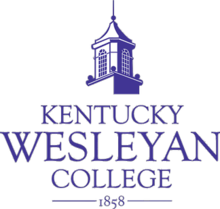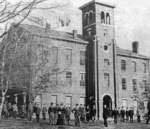Kentucky Wesleyan College
 | |
| Motto | Find Yourself |
|---|---|
| Type | Private college |
| Established | 1858 |
Religious affiliation | United Methodist Church |
Academic affiliations | IAMSCU CIC |
| Endowment | $36.8 million |
| President | Thomas Mitzel |
| Students | 785[1] |
| Location | , U.S. 37°44′37″N 87°07′13″W / 37.7435°N 87.1202°W |
| Campus | Suburban, 55 acres (22 ha) |
| Colors | Purple and white |
Sporting affiliations | NCAA Division II G-MAC |
| Mascot | Panthers |
| Website | www |
 | |
Kentucky Wesleyan College (KWC) is a private Methodist college in Owensboro, Kentucky. Fall 2018 enrollment was 830 students.[2]
History


Kentucky Wesleyan College was founded in 1858 by the Kentucky Conference of the Methodist Episcopal Church. It was originally located in rural Millersburg, Kentucky. Classes began in 1866 and the first commencement took place in 1868. At first, it was a training school for preachers, but soon business and liberal arts classes were added to the curriculum.
In 1890, the school was moved to Winchester and soon after, women began to be admitted for the first time. In 1951, Lawrence W. Hager raised over US$1,000,000 to move the school moved to its present location in Kentucky's fourth largest city, Owensboro.[3][4]
Presidents
College presidents include:[5]
|
1. Charles Taylor (1866–1870)
|
17. David C. Hull (1925–1928) |
Academics
Kentucky Wesleyan offers 30 majors and 13 pre-professional programs[7] and has a student-to-faculty ratio of 13:1.[8] Academics are divided into four divisions: Fine Arts & Humanities, Natural Sciences & Mathematics, Professional Studies, and Social Sciences.[9]
Rankings
Kentucky Wesleyan College was ranked #24 (tie) in the Regional Colleges South category by U.S. News & World Report in 2022–23. The college was also named #33 in Top Performers on Social mobility.[10]
Campus
Kentucky Wesleyan is located on 55 acres of land.[2] Their campus includes buildings for academics, administration, student residence halls, and athletic facilities.
Academic and administrative buildings
- Barnard-Jones Administration building, which houses the Office of Admissions and includes Tapscott Chapel and the Snyder Faculty Office building.
- Winchester Campus Community Center, a student space that has meeting spaces, student organization offices, and the campus security office.
- Hocker Family Dining Center/Greenwell Library and Learning Center, a large building that includes the dining hall, library, computer labs, student work spaces, and group and individual study spaces. This building connects to the Winchester Center for student ease of access.
- Ralph Center for Fine Arts and Communication Arts, an academic building housing the majority of the Fine Arts and Humanities degree programs and the auditorium.
- Yu Hak Hahn Center for the Sciences, an academic building that includes the majority of the Natural Sciences & Mathematics and some Social Sciences degree program classes.
Athletic facilities
The campus includes both student athletic facilities and athlete spaces.[11]
- Jones Gymnasium/Woodward Health and Recreation Center, home to the practice facilities for the university's basketball teams and student health resources.
- Panther Hitting Facility, where university baseball and softball teams practice.
- Panther Park and Foster Field, where the baseball and softball teams compete.
- Panther Field, where the soccer teams practice and compete.
- Bullet Wilson Field at Steele Stadium, where the university's football teams practice and compete.
Student life
Kentucky Wesleyan offers over 40 student organizations on campus. These range from campus ministry, student government, Greek life, academic, and other special interest clubs.[12] Intramural sports are offered on a seasonal basis.
Governing organizations
Several student organizations provide leadership for other students and organizations, including:[13]
- Student Government Association (SGA), the self-governing body on campus that provides students with a voice in college affairs, ranging from administrative to social matters. SGA consists of an elected executive council and senate. Two senators represent each class. Elections are open to any interested student.
- Panhellenic Council, the governing body for the national sororities on campus. It fosters cooperation, good will and harmony among the sororities, plans activities and administers policies and regulations governing Recruitment activities.
- Interfraternity Council, which regulates the affairs of the social fraternities, administers rules governing rush and pledging and encourages cooperation and harmony among its members.
Media and publications
- The Panogram — weekly student newspaper
- 90.3 WKWC — 5,000 watt FM radio station run by students and volunteers
Greek life
Kentucky Wesleyan has three national fraternities and two national sororities.[14]
Campus ministries
Kentucky Wesleyan, as a private Christian college, has partnerships with twelve churches of various denominations as well as on-campus services and religious organizations.[15]
Athletics
The Kentucky Wesleyan (KWU) athletic teams are called the Panthers. The college is a member of the Division II level of the National Collegiate Athletic Association (NCAA), primarily competing in the Great Midwest Athletic Conference (G-MAC) as a founding member since the 2013–14 academic year. The Panthers previously competed as a charter member of the Great Lakes Valley Conference (GLVC) from 1978–79 to 2011–12 (but was fulfilling its commitments to the final year of competition for its other sports in the GLVC as a full member for the 2012–13 school year; before beginning competition as a full G-MAC member). They also competed in the Kentucky Intercollegiate Athletic Conference (KIAC; now currently known as the River States Conference (RSC) since the 2016–17 school year) of the National Association of Intercollegiate Athletics (NAIA) from 1916–17 to 1954–55.
KWU competes in 22 intercollegiate varsity sports: men's teams include baseball, basketball, bowling, cross country, football, golf, soccer, tennis, track & field (indoor and outdoor) and wrestling; while women's sports include basketball, bowling, cross country, golf, soccer, softball, tennis, track & field (indoor and outdoor) and volleyball; and co-ed sports include cheerleading.[16]
Men's basketball
The men's basketball team advanced to the NCAA Men's Division II Basketball Championship Game six consecutive years (1998–2003), winning in 1999 and 2001 under the direction of Ray Harper.[17] In addition to these successes, they won six other championships (1966, 1968, 1969, 1973, 1987, and 1990) and were runners-up in 1957. Overall, Kentucky Wesleyan has won eight NCAA Division II National Men's Basketball Championships, which is the most by any NCAA Division II School.[17]
Notable alumni
This section needs additional citations for verification. (December 2013) |
- Mohamed Abu Arisha (born 1997) - professional basketball player
- Keelan Cole - professional football player
- Urban Valentine Williams Darlington - former bishop of the Methodist Episcopal Church, South
- G. Lindsey Davis - bishop of the United Methodist Church
- Edgar Hager (1868–1935), criminal defense lawyer, Mayor of Ashland, Kentucky, and President of the Kentucky Municipal League.[18][19]
- Ray Harper - college basketball coach
- John Wesley Hughes - founder of Asbury University and Kingswood College in Kentucky
- Joseph Jackson – assistant drama editor at The New York World and Hollywood screenwriter.[20]
- Doug Moseley - Kentucky state senator and United Methodist minister
- Paul A. Porter - former Federal Communications Commission chairman
- Stanley Forman Reed - former Justice of the United States Supreme Court
- Jody Richards - former Speaker of the House, Kentucky House of Representatives
- Roy Hunter Short - Bishop of The Methodist Church and the United Methodist Church
- A. J. Smith - Executive Vice President and General Manager of the San Diego Chargers
- Benjamin T. Spencer - scholar of American literature and professor at Ohio Wesleyan University
- Edward Lewis Tullis - bishop of the Methodist Episcopal Church, South and the United Methodist Church
- Cory Wade - professional baseball player
References
- ^ As of fall 2016. "Student headcount by level: All independent institutions (2006-16)" (PDF). Kentucky Council on Postsecondary Education. Commonwealth of Kentucky. Retrieved 4 March 2018.
- ^ a b "Kentucky Wesleyan College". U.S. News & World Report. Archived from the original on 2018-08-25. Retrieved 29 February 2020.
- ^ "The 10 Biggest Cities In Kentucky". WorldAtlas. Retrieved 2020-02-29.
- ^ "1967 Lawrence Hager 1909". alumni.centre.edu. Retrieved 2023-09-11.
- ^ Presidents of the College Archived 2013-12-27 at the Wayback Machine https://kwc.edu/about-wesleyan/office-of-the-president/presidents-of-the-college/
- ^ "Kentucky Wesleyan College announces appointment of Dr. James Cousins as 36th president". 15 April 2024.
- ^ "About Wesleyan". 14 September 2015. Retrieved 3 November 2017.
- ^ "KWC Common Data Set 2013-2014" (PDF). Archived from the original (PDF) on 13 April 2014. Retrieved 11 April 2014.
- ^ "KWC Academic Divisions". Archived from the original on 13 April 2014. Retrieved 11 April 2014.
- ^ "U.S. News & World Report Best Colleges Kentucky Wesleyan College". U.S. News & World Report. September 12, 2023.
- ^ a b "Visit Campus". Kentucky Wesleyan College. 2015-09-22. Retrieved 2020-02-29.
- ^ "KWC Campus Clubs, Organizations, & Societies". Archived from the original on 29 August 2014. Retrieved 11 April 2014.
- ^ "Campus Clubs, Organizations & Societies". Kentucky Wesleyan College. 2015-10-13. Retrieved 2020-02-29.
- ^ "Greek life at KWC". Archived from the original on 2013-12-27. Retrieved 2013-12-27.
- ^ "Find a Church..." KWC Campus Ministries. Retrieved 2020-02-29.
- ^ Athletic teams
- ^ a b "Men's basketball NCAA Div. II Championships". Archived from the original on 2012-10-26. Retrieved 2012-12-03.
- ^ Katzenberger, George Anthony (1909). Directory of the Legal Fraternity of Phi Delta Phi – via Google Books.
- ^ Phi, Phi Delta (1909). Directory of the International Legal Fraternity of Phi Delta Phi – via Google Books.
- ^ "Film Beauty Weds Publicity Manager". Los Angeles Evening Express. February 19, 1921. p.2. Retrieved February15, 2022.
